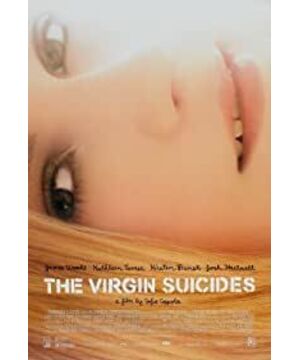In it, everyone sees adolescent girls' yearning for freedom, their resistance to parental authority, and their arrangements for suicide jokes. Maybe this is talking about youth, about the thoughts of young girls who are pregnant, about the desire of a group of teenagers who have just secreted hormones for young girls, and about the complex and elusive temperament in that special period of everyone's life...
People are There is nature, desire, fame, power, wealth, may become part of nature. These natures have given countless people the courage to explore and become the motivation to support their "efforts".
These teenage men and women just use their ignorance to interpret the magic of "nature". The five daughters are full of curiosity about the outside world, and these little boys as narrators have also coveted these five young girls for a long time. A mother in a family of five daughters is an impenetrable wall in the middle of this longing for mutual understanding.
What does this remind me of? Cultural exchange between China and the outside world. Is it weird?
I read "The Prosperous Age of Hunger" a few days ago, I saw the initial collision between the Qing Dynasty and Western civilization in the Qianlong era, and I also learned a little about the context of the mutual influence between civilizations.
At that time, European countries were very passive in the process of trade with the Qing Dynasty. They imported a large amount of tea and porcelain, and the global silver flowed into China continuously. And they, who have just risen because of the industrial revolution, have infinite reverie about opening up the market of 40 million people in China. And after the first few contacts, many of us who are enlightened here are full of curiosity and longing for this novel world. And the ruler is like a mother who has countless beautiful daughters, full of ignorant hostility to the outside world.
The rulers of the Qing Dynasty, like the mother, took care of their subjects in their own way. Since everyone can live at home, why go outside? There are countless risks out there, aren't they? As the mother said in the movie: "Ours is a loving family, and my daughter has no shortage of love at home". She doesn't understand that you can live here, isn't that the most important thing?
Yes, if we never knew the world was colorful, then we wouldn't be curious. And if Western countries never knew of our existence, then everyone can continue to exist in peace.
But the fact is that human nature makes it impossible for you to ignore those prosperous existences in the outside world, and it is impossible for you to lose sight of this group of beautiful angels by chasing desires. It is in this shoving state that the provocative contact takes place. We have finally begun to breed civilizations that have been hybridized in the process of half-assistance with Western civilization. Although many people do not admit it.
However, the plot of the story does not develop in the direction of breaking through the shackles and obtaining liberation. For example, let this group of budding teenagers rescue these girls, for example, the girls really run away from home with them as they imagined, and go far away.
Instead, it was arranged to go to "destruction", why?
In fact, the death of the daughters is the result of the director and the author's self-deduction. They believe that there is no "liberation" and "freedom" in this world. Even if the daughters can escape, they will only be trapped in another cage, and they will eventually face the same death of nothingness. They see the end point, so they can just ignore the process and drive straight to that destination.
The reason why I say this is because the deaths of these girls are calm and not painful. As if it were a joke, a game. They are just tired of it. There is no violent conflict. After they licked the chocolate bar of life a little, they lost interest in tasting it.
From the diaries of their youngest daughters, they know the world around them like the back of their hand; they are dismissive of the basement where the narrator thinks there really is a sewer to reach anyone's house; Magazines like this know the world, and they even know there's a group of "peeps" who know their code.
They inherited genius-like intelligence from their father and obedience without resistance from their mother.
As a result, they understand the truth in this human world faster than others, and share it in a relatively closed environment. One person exposed the lie in that basement, and everyone knew it; one person tried love, and everyone knew it; one person discovered nothingness, and everyone knew it. They pieced together what they knew about each other into a whole world, and unfortunately, there is only darkness here.
So they saw the meaninglessness of resistance and chose to leave. Leave a strange memory for everyone to forget.
If there is no way to understand the outside world, will they come out on their own;
if the teenagers outside fall in love with them morbidly, will they take them out of the house;
if the parent understands that nature is either crazy or dead The vitality of it will not be allowed to grow.
......
The director and the writer don't know either, they just came to this convincing result from their own logic.
The collision of Eastern and Western civilizations is another result of the deduction.
After the initial ravages, we began to fall in love with the industrial revolution of others, and eagerly wanted to integrate into it.
Can we continue to "shut down the country", of course. like North Korea today.
But whether we can be "self-reliant" forever, of course not. After we obsess about the "climax" of the rise of others, it is no longer possible to continue to endure a life of pure heart and few desires indifferently.
Fortunately, few of us believe that the future of any civilization is dark. We don't believe that everyone will face the same demise no matter what, so we didn't choose to go first in this assumption.
However, in fact, we don't have many opportunities to truly understand Western society, democracy and freedom, fairness and justice, openness and equality, and we are just clamoring for what we need here. We don't have that many "magazines" for us to experience. Because of this, society as a whole moves forward in a sway.
As for whether it will "return by different paths", it is not yet known.
In the movie, the death of the youngest daughter is the sick elm tree in front of the door. Although the surface is lush and leafy, if it is not shoveled out, the elm trees in the whole street will die together, just like the other four young girls.
The director and writer did not arrange for all the elms to die. The reason is also unclear - the spread of the virus was isolated, the elm tree was not sick in the first place, and a solution was found. They didn't say it, and they probably didn't know it...
PS: Coppola's narrative, many plots seem to be taken apart. It doesn't make sense, but they're backing the whole movie. This is something that many of our directors don't understand.
For example, in our logic, isolated daughters should panic when approached. They didn't, they were very calm.
For example, parents of five daughters who committed suicide should be heartbroken every minute. They did not, leave calmly, face calmly. Not deliberately arranged to show sadness.
For example, such parents seem to be extremely vicious and hideous. They are not, gentle, and not too hard and violent.
So maybe we should think about how to tell stories...
View more about The Virgin Suicides reviews











